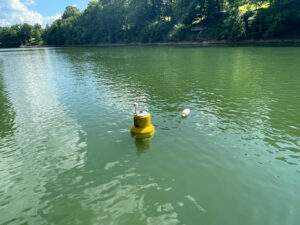Extech VPC300 Video Particle Counter with Built-In Camera
The Extech VPC300 is a unique particle counter with built-in camera for capturing videos and photos that are stored in the internal memory or a microSD card.
Features
- Selectable sample time, count data, and programmable delay
- Stores 5000 records and 20 minutes of video
- 2.8" TFT color LCD screen simultaneously displays 6 channels of particle sizes
- Free ground shipping
- Expedited repair and warranty service
- Lifetime technical support
- More
The Extech VPC300 features a color TFT LCD display, a 74MB internal data storage bank, a micro-SD memory card slot for capturing images and videos for viewing on a PC, and a built-in 320x240 pixel camera for capturing stills/video of test locations. It offers quick and accurate readings for particle count, air temperature, most surface temperatures, and relative humidity. Additionally, it offers a dew point and wet bulb temperature calculation geared for energy efficiency and environmental protection applications. The included PC software enables report generations based on recorded data, images, and videos.
The convenient keystroke menu structure allows for measurements, setup, and other programming. Images can be saved to a PC in JPEG format, and videos in 3GP format. The meter stores up to 5000 records with date and time stamp, as well as 20 minutes of video. A micro-SD memory card slot hosts 8GB maximum memory cards for additional storage space. Selectable sample time, count data, and programmable delay can all be adjusted and viewed using the keypad for navigation. A tripod mount is included for continuous recording. The meter is NIST calibrated for complete assurance.
- Channel of Particle Sizes: 0.3, 0.5, 1.0, 2.5, 5.0, 10μm
- Flow Rate: 0.1ft3 (2.83L/min) controlled by internal pump
- Count Modes: cumulative, differential, concentration
- Counting Efficiency: 50% @ 0.3μm; 100% for particles>0.45
- Coincidence Loss: 5% @ 2,000,000 particles per ft3
- Air Temperature Range: -14 to 140ºF (-25 to 60ºC); Accuracy: ±2ºF/1ºC
- Relative Humidity Range: 0 to 100%RH; Accuracy:±3%RH (40% to 60%RH)
- Dew Point/ Wet Bulb Range: 32 to 122ºF (0 to 50ºC)
- Dimensions/Weight: 9.4 x 3 x 2.2" (240 x 75 x 57mm)/1.26lbs (570g)
- (1) Video particle counter
- (1) NIST-traceable calibration certificate
- (1) Universal AC adapter/charger with multiple plugs
- (1) USB cable
- (1) PC software
- (1) Tripod
- (1) Filter
- (1) 7.4V NiMH battery
- (1) Hard carrying case
In The News
Sustainable Fishing in Alaska: Protecting the Salmon Capital of the World through Research
In the far north, the Alaska Peninsula stretches away from the Last Frontier into the Pacific Ocean. A narrow strip of land dotted with freshwater lakes and intruded upon by ocean inlets–this unique region is intimately connected with the surrounding water. Nestled halfway down the peninsula's southern coast are the small villages of Chignik. The area has historically been home to the Aleut people and has been heavily reliant on fishing for centuries. Home to commercial and subsistence fishing today, Chignik continues to rely upon the salmon returns to the surrounding villages, which are supported by scientists working tirelessly to understand and steward these fish populations.
Read MoreNexSens X3 Data Logger Review
Extreme environments meet extreme design with the NexSens X3 Data Logger . The new logger offers the latest in real-time monitoring technology with wireless communication, a large plug-and-play sensor library and ultra-low power consumption, all in a waterproof marine-grade housing. The X3 is built to handle harsh weather, floods, high winds and rough seas, and it stands alone; no additional protective housing needed. With an operating temperature that ranges from -40°C to 70°C, the logger can withstand arctic environments and extreme heat. A conformal coating on the internal circuit board isolates it from moisture and humidity.
Read MoreBuoy-Based Solutions: Strengthening Kentucky’s Emergency Response Efforts
When Kentucky’s Emergency Response Team (ERT) has to act quickly in response to chemical and oil spills in the Commonwealth, they rely on small, easily deployable buoys to collect critical data that help minimize and evaluate damages in environmental emergencies. With a background in geology, Robert Blair primarily worked with groundwater and got involved sporadically with the ERT during groundwater contamination emergencies. Over time, this involvement led to him joining the ERT as an On-Scene Coordinator and then becoming the branch manager for the team and overall Emergency Response Branch .
Read More






